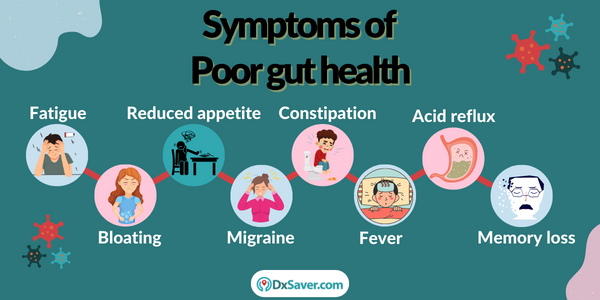
Do you have signs of exhaustion or confusion? Are you suffering from celiac disease? A gut health test is a test that checks for your body’s health and helps you analyze how your health is affected by gut bacteria.
This blog provides you with information about gut health, health conditions associated with gut health, and the required treatment for poor gut health.- What is gut health?
- Why is gut health important?
- What are the factors that affect your gut health?
- What are the symptoms of poor gut health?
- What are the health conditions associated with an unhealthy gut?
- How to test your gut health?
- When to take the gut health test?
- What do the results of the gut health test mean?
How much does the Gut health test cost?
The gut health test costs $299 in the U.S. The cost of this test also depends on your choice of visiting the nearest lab or getting tested at home using the home test kit. Complete the procedure and get the results in your email within 10 business days. Doctor consultation is also available for further treatment or medical advice.
The following table shows the Gut health test kit cost by one of our partners located in the U.S.
Name of our Partner Lab | Book Online |
EmpowerDx Lab(Home Test Kit)
| Offer Price$299 Book Now |
What is gut health?
Gut health represents the condition of your microbiome, a term that describes the ecosystem in your gut where both good and bad microorganisms coexist. These microorganisms include fungi, bacteria, and viruses. They break down vitamins and minerals and create the compounds your body requires for different processes. Besides facilitating metabolism, good microbes control unhealthy microorganisms and frequently reproduce so that the infected type cannot expand.
Why is gut health important?
The health of your gut plays a fundamental role in the health of your body. Your gastrointestinal tract absorbs nutrients to maintain your body and eliminates toxins. When there is an optimal balance of appropriate microbes in your stomach, there is an absorption of essential compounds by the bloodstream. It also leads to reduced intestinal permeability.
Thus, gut health is vital because an unhealthy gut causes inefficient functioning of the immune system and disables the creation of essential hormones.
What are the factors that affect your gut health?
Some of the common factors that lead to poor digestive health are listed as follows:
- Drinking alcohol – Drinks with a high alcohol concentration can postpone stomach emptying and thus leads to inflammation in the abdomen.
- Poor eating habits – Unhealthy food choices deny your body a variety of essential minerals, because of which your gut health deteriorates.
- Stress – Your tension levels may increase the risk of intestinal permeability and cause a leaky gut syndrome.
- An inactive lifestyle – Being idle without any physical activities slows down the process of digestion.
- Food allergies – Dietary sensitivities prevent you from digesting particular nutrients.
- Consumption of particular medications: Extensive usage of antibiotics can destroy the good bacteria in your stomach.

What are the symptoms of poor gut health?
The symptoms that indicate an unhealthy gut are listed as follows:- Frequent dehydration
- Fever
- Brain Fog
- Bloating
- Memory loss
- Release of acid
- Constipation
- Poor attention
- Tiredness
- Physical discomfort
- Problems with weight
- Limited appetite
- Anxiety
- Sour moods
- Diarrhea

What are the health conditions associated with an unhealthy gut?
Inefficient functioning of your intestine can severely affect the health of your body and eventually cause the following health conditions:
Leaky gut syndrome:
A digestive disorder called leaky gut syndrome occurs when the gut wall allows toxins and germs to enter the bloodstream. It implies a rise in the permeability of the intestinal lining, which may contribute to Crohn’s disease and other illnesses such as Crohn’s disease, diabetes, and Irritable Bowel Syndrome (IBS). There is no standard care for the leaky gut because various medical professionals disagree that it is a real medical issue. You can strengthen your gut wall by making some dietary and lifestyle adjustments such as regular exercise, getting good sleep, and following a healthy diet.
Celiac disease:
Celiac disease leads to poor gut health because your body’s immune system attacks your small intestine when you eat gluten. The small intestine suffers damage and loses its capacity to receive nutrients. After starting to consume gluten, celiac disease can appear at any age. If you do not treat celiac disease, you can experience severe health issues. The solution for this disease is to follow a rigorous gluten-free diet. According to NIH researchers, an estimated 2 million Americans are affected by celiac disease.
Irritable Bowel Syndrome (IBS):
The stomach and intestines, collectively known as the gastrointestinal system, are affected by this disease known as irritable bowel syndrome (IBS). IBS makes your digestive tract extremely sensitive and alters the contraction of your gut muscles. So, you experience constipation, diarrhea, and stomach discomfort. The NIH states that an estimated 10% to 15% of adult Americans are affected by IBS. Gastroenterologists commonly diagnose such conditions.
Crohn’s disease:
Crohn’s disease is a chronic inflammatory bowel disease (IBD) affecting the small and large intestines. So you experience inflammation and irritation. Although medication can manage or decrease the symptoms and prevent the risk, Crohn’s disease currently has no known cure. Occasionally there might be a need for surgery. Crohn’s disease impacts An estimated half a million people in America.
How to test your gut health?
An at-home gut health test is taken to check for your gut health by looking for the 11 metabolites crucial to your health.
The 11 metabolites measured by the gut health test are Uric acid, tryptophan, kynurenine, tyrosine, serotonin, total indoxyl sulfate, 3-methylxanthine, xanthine, indole-3-propionic acid, indole-3-acetic acid, and indole-3-lactic acid.
The metabolites are divided into five groups based on health concerns because each group involves a set of metabolites essential for the body’s functioning. The required compounds for the groups are listed as follows:
- Endurance for the digestive system: indole-3-propionic acid, indole-3-acetic acid, indole-3-lactic acid, tryptophan, serotonin, uric acid, tyrosine, total indoxyl sulfate, and 3-methylxanthine
- Immune strength: indole-3-propionic acid, tryptophan, serotonin, uric acid, kynurenine, tyrosine, and total indoxyl sulfate
- Emotional equilibrium: tryptophan, serotonin, kynurenine, and 3-methylxanthine
- Mental agility: indole-3-propionic acid, tryptophan, serotonin, and kynurenine
- Energy effectiveness: tryptophan, kynurenine, tyrosine, and xanthine
A Gut Health Test kit is a quick blood test that you can do at home. Just prick your finger, put your collected sample in the envelope, and submit it to the labs registered by CLIA to test for your gut health. The Ixcela Gut Health Test does not require a period of fasting. You should follow your regular schedule. Also, you should prevent the acetaminophen (Tylenol) medication 72 hours before your sample collection.
When to take the gut health test?
You can take the gut health test if you experience the following:
- You inherit the celiac disease HLA gene
- You are trying to battle away your sickness
- You want to learn to enhance your digestive health
- You require improved physical well-being
- You experience symptoms of poor gut health like headache and gut inflammation.
When to take the gut health test?
You can take the gut health test if:
- You inherit the celiac disease HLA gene
- You are trying to battle away your sickness
- You want to learn to enhance your digestive health
- You require improved physical well-being
- You experience symptoms of poor gut health like headache and gut inflammation.
What do the results of the gut health test mean?
Your 11 digestive health metabolites will be evaluated in the digital summary. You will have a proper analysis of your general health. You can access your gut health test results on your Ixcela site within ten business days. The dietician from Ixcela summarizes your results and assists you in setting priorities for your way of life.
Also, you will get personalized health scores for intestinal strength, immunity levels, emotional stability, psychological clarity, and energy effectiveness.
Canva
Additionally, you can participate in group seminars where a certified dietitian from Ixcela informs you about healthy food choices, customized exercise, and fitness tips.
What happens after a gut health test?
A combination of nutritional and behavioral alterations is required to improve gut health. The following are the required lifestyle changes to have a healthy gut:- Having a regular circadian cycle and getting sufficient sleep
- Reduced alcohol intake
- Avoid taking antibiotics
- Frequent exercise
- Meditate often to reduce stress
- Fermented foods: The majority of fermented foods, such as kimchi, kombucha, kefir, and tempeh, are incredibly beneficial for your health.
- Vegetables: Try incorporating several greens, such as lentils, cabbage, onion, and asparagus.
- Fruits: The majority of fruits are rich in plant fiber, which is a great source of sustenance for the microbes in your intestines.
- Seeds and nuts: Seeds and nuts such as sunflower seeds and almonds are great for your digestive health because they are high in protein and plant fiber.
- Whole grains: Healthy food options such as brown rice, barley, and millet are good for your intestinal health
- Collagen-promoting foods: The body can produce more collagen if it consumes foods rich in collagen, such as meat, seafood, poultry, eggs, and dairy products.

Frequently asked questions:
What is gut microbiota?
The countless numbers of bacteria, fungi, viruses, and other microbes that inhabit our intestines are gut microbiota. The microbes greatly benefit our general health because they enable us to process foods like plant fiber and play a crucial part in controlling digestion and supporting our immune system.
What causes bloating?
Many factors like stress, fizzy drinks, indigestion, food sensitivities, and overeating cause bloating.
What should I do now that the test kit has arrived?
You have to schedule your sample collection and shipping for the same day. You should register your equipment on the Ixcela website to get your results.
When will I get my results?
You will get your results within ten days of the lab getting your sample. You should follow the instructions in the package to register your test kit and finish your health profile to prevent delays.
Can gut health affect your skin?
Gut microbiota has been connected to a distorted immune response and increases the risk of skin conditions like atopic dermatitis, psoriasis, acne vulgaris, dandruff, and even skin cancer.Other topics that you may be interested in: –
- Celiac Disease test cost in the U.S.?
- Why is mental health important?
- What is the treatment for seasonal allergies?
- What are skin care problems?
- What is Glyphosate Exposure: Symptoms, Testing Cost, and Prevention
- Why do you need a mineral test?
- Inflammation testing cost in the U.S.
- STD Testing in New York City
- Treatment for nutrient deficiency
- When to test for heart health?
- Vaginitis test cost in the U.S.
- What is a lead blood test?
- Types of anemia
- Symptoms of oat allergy
- What are the complications of seasonal allergies?
- Cost of Tetanus Testing in the U.S.
- What are the symptoms of mold allergy?
- Treatment required for nut allergy
- Importance of Blood type test
- Planned Parenthood STD Testing Cost Vs. Other Health Providers






